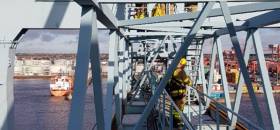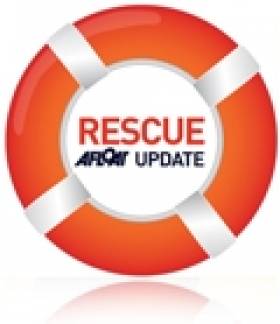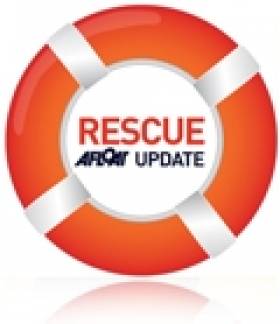Displaying items by tag: Dublin Fire Brigade
Scaling New Heights As Dublin Fire Brigade Practice Exercises from Port Container Cranes
#DublinPort - In recent weeks Dublin firefighters scaled 110ft high container gantry cranes in Dublin Port so to play out real life situations as part of an ongoing height training programme.
Firefighters and paramedics from Dublin Fire Brigade were invited to the port by terminal operator Peel Ports, where they were given the chance to practice for worst case scenarios at height.
The cranes are used to load and unload container ships calling at the port and bound for locations in the UK, the Netherlands, France, Iberia and onwards worldwide. Up to 170,000 TEU pass through Peel Ports’ MTL container terminal each year, carrying a variety of goods and materials.
Firefighters recreated a situation whereby a crane driver had suffered a heart attack while in the cab. From the arrival of the height rescue team, they had scaled the crane, treated the driver and safely brought them to ground level within 28 minutes. This scenario also had an advanced paramedic treat the casualty from the top until they were lowered.
In a second drill, a maintenance engineer suffering spinal injuries was stabilised and brought to ground level while being treated by paramedics within 40 minutes.
The visit was also used by Peel Ports to strengthen and test its own health and safety procedures.
John Robinson, an officer and heights rescue instructor at Dublin Fire Brigade, said “It’s a great opportunity to train with the cranes here in the port. This allows us to build our training around a real life scenario that our fire crews could get called to and makes it interesting for them. I’d like to thank Peel Ports for allowing us to train on their facilities and we look forward to building this relationship further in the future.”
Stephen O’Gara, Operations Manager from Peel Ports, said: “We would like to offer our thanks to Dublin Fire Brigade for accepting our invitation to train using our facilities at the port. Working closely with our emergency services and preparing for the worst case scenarios ahead of time is incredibly beneficial for everyone involved and could be crucial when it comes to resolving a potentially life threatening situation. Health and safety is absolutely crucial to everything we do at Peel Ports, with our central aim that each member of staff returns home safely every day. We look forward to welcoming the fire crew back to the port at a future date and continue developing this important relationship”
For more information on Safety365 click HERE
New Emergency Info System Put Through Its Paces
#Rescue - The Irish Coast Guard and the RNLI were among the emergency services putting some new communication technology to the test last month.
As Phys.org reports, the emergency exercise in Malahide Estuary was designed to test the effectiveness of REACT, or Resource for Emergency services to Access Command and control data using satellite and hybrid Technologies.
The system, funded by the European Space Agency (ESA), employs satellite, mobile and other communications systems to maintain a constant open channel between different response services, even if one network goes down during a crisis.
Rescue teams in the field can also remain in two-way multimedia contact with co-ordinators in the control room to ensure the right people are where they need to be as quickly as possible.
Ritchie Hedderman, head of operations at the Dublin Fire Brigade, which also took part in the exercise, said: "In the event of a major emergency, secure and reliable communications are vital to the emergency services.
"I feel that the satellite communications in time will prove to be the primary and preferred means for communicating as it can supply voice, video and data back to regional and national control centres where strategic commanders can assess situation on the ground and provide the back up resources in order that a successful conclusion to the emergency can be obtained."
Phys.org has much more on the story HERE.
Body of Woman Recovered from Liffey in Dublin City Centre
#NEWS UPDATE - The body of a woman was taken from the River Liffey in Dublin city centre last night (29 November), as The Irish Times reports.
The woman, understood to be in her mid-30s, was seen entering the water at O'Connell Bridge around 8.45pm and was recovered by Dublin Fire Brigade river rescue specialists around five minutes later.
It's thought the woman may have died from a heart attack.
A passer-by who made an unsuccessful rescue bid did not require serious medical attention.
Gardaí Renew Appeal for Witnesses to Liffey Death
Dublin Gardaí are still appealing for information on the drowing of a Co Tyrone man in the River Liffey last weekend.
RTÉ News reports that Aiden Mullen, 35, had been socialising in the city after the All-Ireland Football Championship match at Croke Park on Saturday 30 July.
At around 3.20am last Sunday morning, Mullen was waiting with his brother and friends on Burgh Quay for taxis home when he broke away from the group and approached the river wall.
He was last seen falling into the water by his brother, who jumped in to assist him. Both men, as well as three passers-by who entered the water to help, got into difficulty.
Dublin Fire Brigade rescued four from the river, but Mullen's body was discovered shortly after.
Gardaí say a number of witnesses have already come forward, but they would like anyone else with information to contact them at Pearse Street Garda Station.
Flood Evacuation Exercise in Fingal This Weekend
Members of the public are invited to attend a major flood evacuation training exercise this Saturday at Broadmeadow Esturary in Swords, Co Dublin.
Rescue and boat rescue crews from the Irish Coast Guard are sceduled to join teams from the Dublin Fire Brigade, the Civil Defence Fire Service and Gardaí in the exercise, which will simulate the rescue of a group of people stranded after a flash flood.
The crews will test water rescue and river search procedures, with an emphasis on general water safety and providing assistance to other search and rescue agencies.
The excercise will begin at 11am on Saturday 16 April and will last for one hour. Members of the public are welcome to observe must must obey any instructions and must not interefere with the exercise.
For more information contact Bill Powderly, assistant chief Civil Defence officer with responsibility for the Fingal Area, at [email protected] or 086 380 5197.


































































